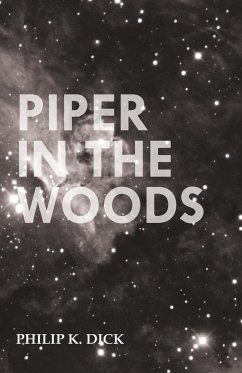Venture into the depths of psychological chaos as Philip K. Dick, the visionary author behind iconic films like Blade Runner and Minority Report , unravels a spellbinding tale with Piper in the Woods.Originally published in 1953, this science fiction short story teems with dark humor and an unsettling twist. When an army doctor, Henry Harris, encounters a string of bizarre cases of soldiers returning from asteroid Y-3 claiming to be plants, he journeys to the cosmic frontier in search of answers. On Y-3, Harris stumbles upon the captivating myth of the "Pipers"; enigmatic beings who live in the woods and are purportedly transforming soldiers into vegetation. An intricate dance of speculative fiction and psychological depth, Piper in the Woods captures the struggle of repressed soldiers seeking solace amidst the bleak landscape of a little-known asteroid. Plunge into this engrossing narrative as you uncover the truth behind Y-3's mysterious Pipers and witness Dr. Harris' startling journey of self-discovery.








